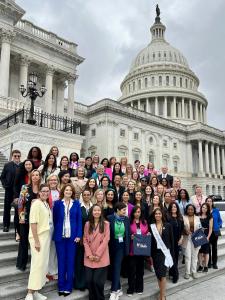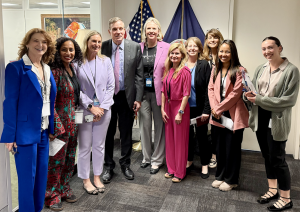
Mainstreaming Women's Health in Congress with the First-Ever Women's Health Capitol Hill Day

Women's Health Advocates who are national leaders from the life sciences industry and non-profits, investors, physicians, researchers and patient advocates descended on the nation’s capital from across the country.
First-ever Women's Health Capitol Hill Day includes Congressional Briefing with Experts Highlighting Gaps and Opportunities to Advance the Health of Women
Approximately 90 national leaders from the life sciences industry and non-profits, investors, physicians, researchers and patient advocates descended on the nation’s capital this week from across the country, representing half the states, such as California, Arizona, Texas, Iowa, Ohio, New Jersey, New York, Massachusetts, Florida, and Alabama, among others. The Women’s Health Advocates shared their professional expertise as physicians, entrepreneurs, investors, researchers and patient advocates during the Congressional Briefing entitled “Sex Matters: Learn How Sex Differences Impact Medical Research, Innovation, Health Outcomes, the Economy and More,” and in conversations with Members of Congress, such as Senator Mark Warner (D-VA) and Rep. Max Miller (R-OH), and their staff. With the goal of raising awareness about women’s health gaps, the sex differences that exist at the cellular level impacting how diseases and treatments impact the body, factors shaping the health of women and ways to close gaps that strengthen families and the economy, the Advocates provided powerful evidence on the need for systemic changes.
The briefing kicked off with remarks by former award winning NBC correspondent turned entrepreneur following her breast cancer diagnosis, Kristen Dahlgren. “Women’s health is a $1 trillion economic opportunity. That is good for America,” said Dahlgren, who founded the Cancer Vaccine Coalition and explained that by investing in research, a shot in the arm could prevent cancer. “I want everyone to know that these cancer vaccines could and are already saving lives.”
Rep. Ciscomani followed, stating the key conditions impacting women disproportionately and differently that he is focused on include coronary artery disease, lung cancer, Alzheimer’s disease and autoimmune diseases and added his direct connection to women’s health. “I care deeply about this issue because it is personal…Breast cancer runs rapidly in her family. My mom lost her mom when she was seven years old with two younger sisters,” said Rep. Ciscomani, who hosted a Women’s Health Roundtable in October to address the need to advance research initiatives, expand healthcare access, and promote innovation in women’s healthcare.
“Heart disease is the number one killer of women and I went across the country telling my story because that is most important. When you tell your story there is someone out there that you have no idea they too have had the same health challenge,” said Rep. Beatty, who is a stroke survivor, co-chair of the Congressional Heart and Stroke Coalition and consistently leading on the introduction of stroke legislation.
Alisa Wilson, PhD, Life Sciences Managing Director for Accenture and author of Springboard Women’s Health Report entitled “Re-defining Women’s Health” that was released on May 20th explained how women’s health is often overlooked in healthcare in two areas. “Cardiovascular disease is the number one cause of death for women globally and there are more incidences of cardiovascular disease than all cancers combined and women make up 78% of the autoimmune disease patient population,” said Wilson. Her top recommendation for women is to participate in clinical trials to gather more accurate data as currently there is insufficient participation of women, and especially women of color, and studies are aggregated by sex only 50% of the time.
“Women are not little men; we have unique needs throughout the lifespan; we continue to have a gap in data because women have been historically underrepresented in clinical studies,” explained Nada Hanafi, MPH, MSc, co-founder of MedTech Strategy Advisors and former senior science advisor at the Food and Drug Administration (FDA) with expertise in ensuring increased accuracy in studies through enrollment in studies that are representative of disease impact in the broader population.
In addition to FDA clinical trials, CMS reimbursement is shaping the health of women pointed out Dr. Jocelyn Fitzgerald, a Urogynecology and Pelvic Reconstructive Surgeon at UPMC Magee-Women’s Health and author of Price and Prejudice: Reimbursement of Surgical Care on Male Versus Female Anatomies. “Women are automatically worth less money for a hospital; that bottom line is what matters,” said Dr. Jocelyn Fitzgerald as she explained that after reviewing over 100 reimbursement codes, she found that essentially the same procedures are reimbursed 30% on average lower for females as compared to males—but sometimes as much as 50% lower—by the Centers for Medicare and Medicaid (CMS).
Gaslighting and racial bias are other dynamics shaping the health of women that was shared by Dr. Bayo Curry-Winchell, who survived hemorrhaging after her child was born only because she pushed to call her doctor’s cell phone in the very hospital where she serves as the Urgent Care Medical Director. Yet another gaslighting story that cost the life of a 17-year old girl from Pittsburgh, PA was shared by Lynn Banaszak, CEO of the Caileigh Lynn McDowell Foundation.
“Caileigh died because of the bias of the medical system when it comes to women and diagnosing what we say is causing us pain. She died because the system sees young girls as dramatic and perhaps not credible. The system assumes mental health issues in young women before exploring physical causes. The system is built to ignore the specific ways illness manifests in women differently than men,” shared Banaszak.
Entrepreneurship driven by the diagnostic odyssey was another factor addressed during the briefing. “I was a woman feeling like no matter where I went, I never could get answers from any doctor. It was always: drink more water, sleep more and have a less stressful job,” said Priyanka Jain, co-founder and CEO of Evvy as she explained why she started the company in 2021 to address the number one reason for why women visit their doctors. Since then, the company has served over 50,000 users with the first and only at-home test that includes one swab used to check for all bacteria and fungi present with metagenomics, an advanced form of sequencing.
The intersection of hormones, menopause, Alzheimer’s and heart health was also addressed by the panelists. “The gaps in cardiac care for women include critical delays in symptom recognition, leading to heart attacks being more often fatal in women than men,” explained Dr. Jayne Morgan, who is a cardiologist, Vice President of Medical Affairs at Hello Heart, and on-air medical news expert.
Other speakers included Linda Goler Blount, MPH (CEO, Community Catalyst), Dr. Elizabeth Garner (CEO, Sena Therapeutics and past president of the American Medical Women’s Association), Vanessa Joy Walker (breast cancer and mental health patient advocate and founder of “Living After Crisis”), Meryl Comer (Co-Founder, Us Against Alzheimer’s and Vice Chair, WHAM), Piraye Beim, PhD (CEO, Celmatix Therapeutics and Chair of the Endometriosis Foundation), and Dr. Mitzi Krockover (Managing Director, Golden Seeds and Producer, Beyond the Paper Gown).
Following the briefing, Women’s Health Advocates broke up into teams and walked the halls of Congress to share five key priorities—all of which pertain to the budget and reconciliation, which Congress was crafting and negotiating to garner the full support of the Republicans in the House:
(1) Women’s Health Research Interdisciplinary Fund within NIH
(2) Women’s Health Innovation Program within FDA
(3) Perimenopause and Menopause report on research, gaps and training resources for providers relating to mid-life women’s health care within the military
(4) Preservation of health research grants that study women and impact of conditions using sex-based data
(5) Medicaid programs and services that enhance the health of women and their babies, such as access to care during the entire first year postpartum
The day ended with a reception with remarks shared by several members of Congress and menopause expert, Dr. Sharon Malone, who is an OB-GYN, Chief Medical Advisor for Alloy Women’s Health and author of “Grown Women Talk.” Other speakers included Lauren Ruotolo, who shared how her rare disease has shaped her life and why cuts to NIH could mean an end to the rare disease study she participates in.
Speaker Emerita Nancy Pelosi shared how in the 1990s she teamed up with fellow members of the Appropriations Committee: Rep. Rosa DeLauro (D-CT) and former Rep. Nita Lowey (D-NY) to fight for the inclusion of women in clinical studies and for $100 million for breast cancer research, as there was no significant funding at the time for this disease. “Your mobilization, your coming to Washington, your advocating is so important because members have to hear from their own constituents. Nothing is more eloquent to a member of Congress than the voice of their own constituent,” said Pelosi.
Finally, Rep. Mariannette Miller-Meeks (R-IA) shared, “Obesity, 3D mammograms, access to care, support for mothers, and paid family leave for women’s well-being are some of the issues I’ve worked on in Congress, but nothing moves in Congress [without you]. For you to be here is critically important to advocate and educate. The voices that you bring are very important, but remember the journey of 1,000 miles begins with just one step.”
Women’s Health Advocates (WHA):
Women’s Health Advocates was founded by Liz Powell, Esq., MPH, who is the founder of G2G Consulting and has over 25 years of experience in working for and with government on policy, lobbying and grassroots mobilization. WHA is uniting people to educate government decision-makers on women’s health gaps and policies and funding needed to advance the health of women. It consists of people in all 50 states covering all sectors of women’s health as patients, physicians, investors, entrepreneurs, executives in business and nonprofits, and public health and policy experts. Learn more at www.WomensHealthAdvocates.org.
###
Liz Powell
G2G Consulting & Women's Health Advocates
+1 202-445-4242
email us here
Visit us on social media:
LinkedIn
Distribution channels: Banking, Finance & Investment Industry, Business & Economy, Culture, Society & Lifestyle, Healthcare & Pharmaceuticals Industry, Politics
Legal Disclaimer:
EIN Presswire provides this news content "as is" without warranty of any kind. We do not accept any responsibility or liability for the accuracy, content, images, videos, licenses, completeness, legality, or reliability of the information contained in this article. If you have any complaints or copyright issues related to this article, kindly contact the author above.
Submit your press release



